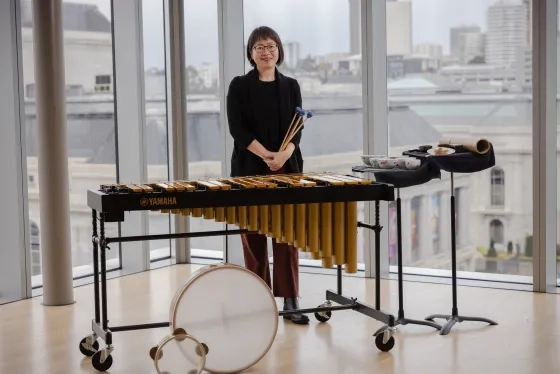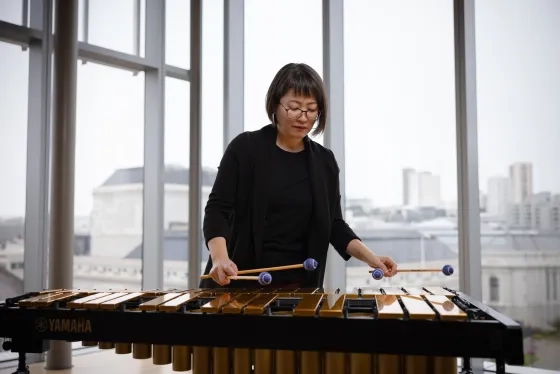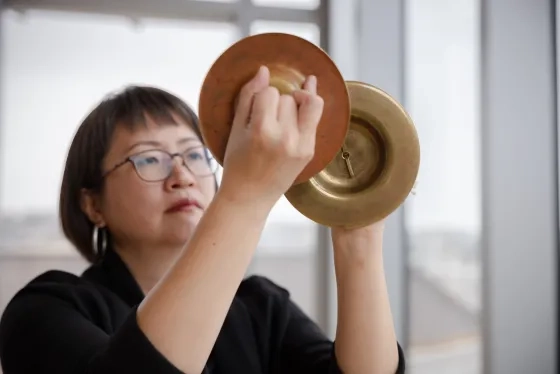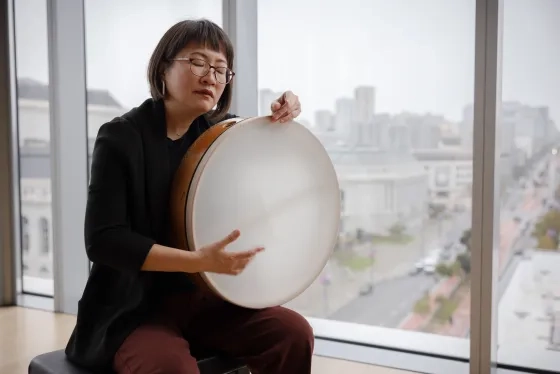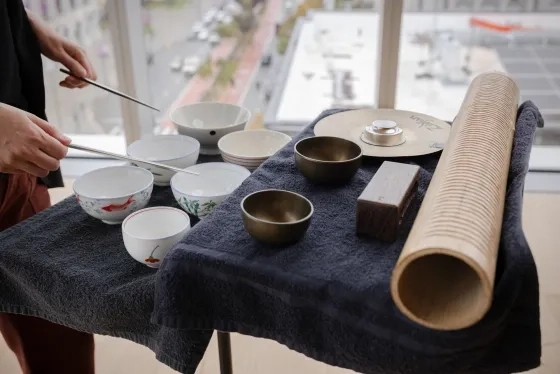SFCM's Haruka Fujii on Percussion, Playing with Yo-Yo Ma, and Seeing Drums Everywhere
Fujii, who arrived at SFCM in 2022, has been playing with Silkroad Ensemble (founded by Yo-Yo Ma) since 2010 and now serves as its Associate Artistic Director with GRAMMY winner Rhiannon Giddens.
"Percussion" already has a vast world of meanings to different musicians and culture—and SFCM faculty Haruka Fujii is working on growing it.
Born and raised in Japan to Mutsuko Fujii, an influential marimbist who contributed to the rise and the development of marimba music in Japan, Fujii isn't just a virtuoso musician, she's a custodian of the country's history with keyboard percussion. "The history of keyboard percussion in Japan starts in the early 1600s, during the Edo period," she explains. "Because of the Tokugawa government and how it was run, the country was essentially closed for a few hundred years, and there were only a couple of ports that were allowed to trade and communicate with the rest of the world. Then, one day, a small keyboard percussion instrument arrived at Nagasaki port."
It's fitting that Fujii is now Associate Artistic Director of Silkroad Ensemble, which she joined in 2010: The arrival of one of her chosen instruments couldn't have happened without the group's namesake trade route. "Marimbas originate in Africa and spread from there to Central and North America," Fujii says. "But there's another stream that started in Southeast Asia, Java and Indonesia: Gamelan music. That floats around along the Silk Road and it goes to China and Korea, Burma and all these different places there."
Despite only being a small, boat-shaped xylophone, the instrument's arrival in Japan was momentous. The country was so captivated by it that a play about its journey was written for the traditional kabuki theater about a man who'd traveled the world and acquired a xylophone.
Three-hundred or so years later, Fujii started playing piano inspired by her mother and eventually changed over to percussion before following an international route of her own. "I had always been a fangirl of New York and really wanted to go there," she says. "So I moved to New York without speaking any English and got into school. It was quite a journey: Aside from not knowing the language, technique-wise, method-wise, everything was different."
It was in New York that Fujii met some founding members of Silkroad Ensemble, seeking another percussionist for the group. Joining what she calls "this amazing family that really literally changed my life," she felt she was now representing not only herself but also my country. "The Ensemble is such a melting pot of different elements from all over the world; it really made me want to have something that I could introduce from Japan," she explains, displaying a pair of chappa cymbals. "These are traditionally used in festivals and Shinto ceremonies," she adds, "I really fell in love with them and I introduced that sound into Silkroad." (Since returning to San Francisco in 2014, Fujii founded Nippon Kobo, an organization dedicated to contemporary Asian-American arts and culture: Covered by San Francisco Classical Voice in September, their June 1 event is waitlist-only.)
Fujii was musically omnivorous, describing herself as "a sponge, absorbing whatever I could," before adding, "Anything I saw that I wanted to learn, I did, and anything that I could make a percussion sound with, I did." She became enamored with frame drumming, which she said "really opened me up to different drums, different palettes of percussion from around the world. Ever since, I've just kept expanding that."
That expansion now includes a set of rice bowls that she plays with chopsticks, inspired by a piece by David Lang that involved teacups and tuned flowerpots. "I just started finding different pitches of rice bowls, wandering around stores with a tuner and adding more and more to my collection," she laughs. "I've added some other everyday life elements, like the chopsticks and an Amazon delivery box; I also have a really big glass salad bowl and by putting water in it you can actually change its pitch. It sounds really beautiful, like a temple bell."
Unsurprisingly given her lineage, Fujii has a long view of her field. "The definition of 'percussionist' itself is still being refined," she says. "It's been only around 100 years since percussionists became recognized as soloists in Western classical music. But the oldest music in the world was made with drums, so if we actually look that far back, our modern repertoire, technique, instruments, and approaches are still so young and still being developed! That's what excites me the most."
Ultimately, that’s what she hopes to impart to her students: possibilities. "Just like we have endless objects we could call percussion instruments," she says, "There are so many different ways of being a percussionist: orchestral, drum kit, frame drums and other hand percussion drums, marimbist—just to name a few. In this unlimited world of percussion, I support each student's interest and passion to identify their path forward as a percussionist."
When you can look at the world and see opportunities to make music with anything you can touch, Fujii adds, "Nothing is set."
Learn more about studying percussion at SFCM.
